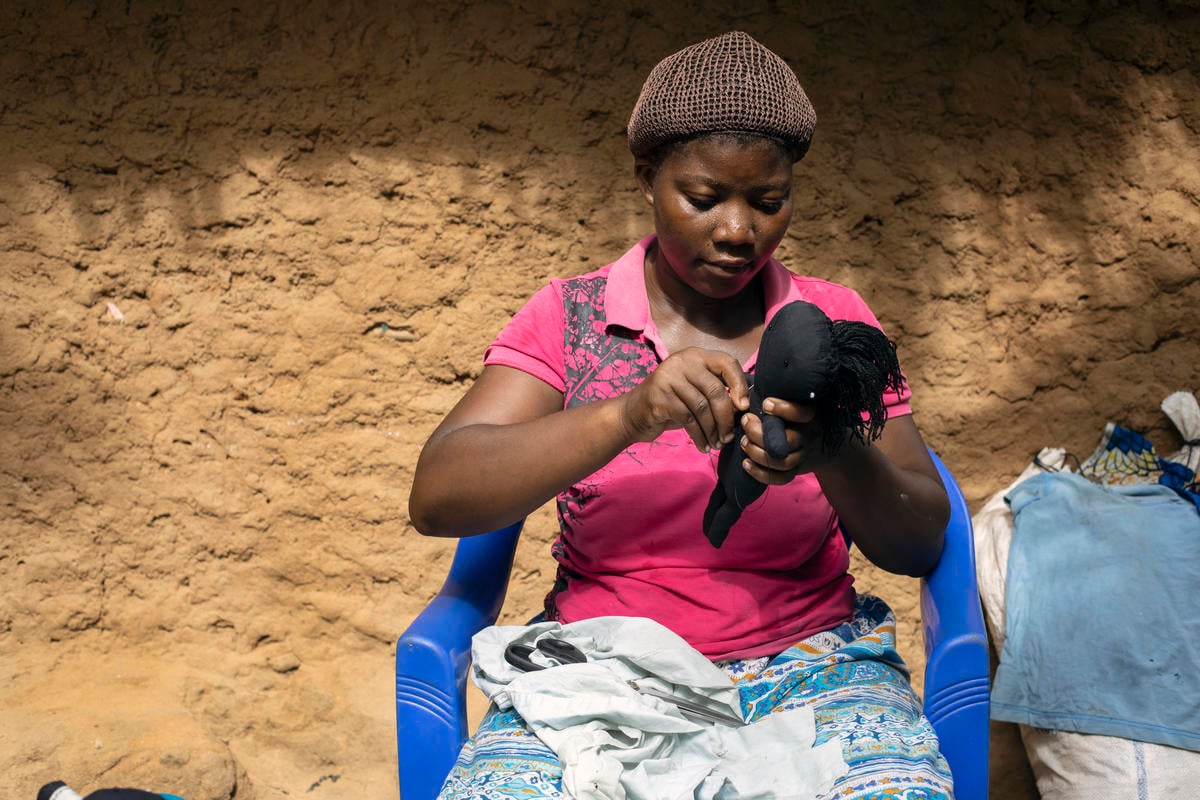By Theresa Beltramo and Sandra Sequeira

Informed by evidence that the Graduation Program is a proven approach to reducing poverty through helping people find jobs or start a business, UNHCR implemented a program in Nampula, Northern Mozambique, from September 2019 to December 2021 for ultra-poor refugees and host communities living in and around the Maratane settlement.
UNHCR and the London School of Economics (LSE) recently undertook an impact evaluation – the first of its kind measuring the impact of the graduation program in refugee settings – to study the effectiveness of the program’s interventions. The evaluation followed 460 program participants across refugees and Mozambicans living in the areas around the settlement.
Just after the program finished, a devastating Category 3 cyclone struck Mozambique- Tropical Cyclone Gombe. Pre-planned data collection follow-up after the program finished allowed us to measure the cyclone’s impacts on the program participants.
Main finding #1: Graduation program participants saved more, earned more, and were more financially security than those on the program waiting list
Participants of the program reported significant improvements in their financial security. Compared to the control group, the participants reported a 600% increase in their monthly savings and a 66% increase in their household incomes and overall felt 62% more financially secure by 62%.[1]

Main finding #2: Food security improved
Overall, participants said they felt less food insecure. Measured by the average meals eaten per day, children and adults said they ate better by 15.9% and 22.6%, respectively. At the start of the program, participants from the host community reported feeling more food secure. However, by program’s end, refugees, especially female ones, reported more significant improvements in food security.
Main finding #3: As financial security improved, host community members trusted refugees more
As financial security improved, Mozambicans who were part of the program were 18% more willing to share jobs with refugees. The program also improved social cohesion – Mozambican nationals and refugees reported higher levels of trust and had a higher share of friends across the two communities.
Improved financial security is also associated with increased feelings of belonging and job satisfaction. These effects are particularly pronounced for host community members living closer to the refugee community and those who started with a lower level of financial security at baseline.
This evaluation’s finding that stronger financial security improved social cohesion is consistent with existing global evidence on the positive relationship between feeling financially secure and being more trusting. Financial security may be particularly important in settings characterized by scarce resources and high social fragmentation, such as when refugees try to integrate into host communities.
Main finding #4: Negative shock to financial security threatens social cohesion
In the face of the negative climate shock, we find social cohesion outcomes are fragile and easily eroded. In March 2022, just three months after the program ended, Tropical Cyclone Gombe hit the Nampula region. The cyclone path landed 5 kilometers from the refugee settlement. Those directly affected suffered severe damage to their houses and assets, compromising their financial security.
A survey conducted two to three months after the cyclone showed that after adjusting for the quality of housing, survey participants experiencing the largest drops in financial security due to the Tropical Cyclone also experienced the largest declines in social cohesion, almost fully offsetting the benefits in social cohesion brought about by the program. Mozambicans who had their homes and crops destroyed were again less trusting of refugees and less willing to share resources with them. These results suggest that improvements in social integration can be quickly reversed as financial conditions deteriorate. This is particularly problematic as climate shocks are expected to become increasingly frequent.
Thus, while targeted cash and employment support programs can help the ultra-poor become financially resilient to shocks of this nature, the social cohesion gains that can come with these programs can disappear when the ultra-poor are exposed to adverse climate shocks.
Policy implication #1: Increasing investments in graduation programs could tackle the twin goals of improving economic resilience and refugee integration
Given that 74% of refugees are currently in a situation of protracted displacement and relatively few have felt safe to repatriate home or been offered the opportunity to resettle abroad (less than 1%), the socioeconomic integration of refugees into host communities is a critical pathway for solutions for refugees.
The findings suggest that an improvement in financial security makes the competition for resources (both within and across groups) and the differences between groups less salient. This opened the door to more interactions with out-groups that resulted in friendships and more overall trust.
Therefore, the investment of humanitarian resources in graduation programs for ultra-poor members of both the host and refugee community is an important strategy to promote social cohesion, alleviate tensions and consequently pave the way for the economic and social integration of refugees into environments frequently characterized by a significant scarcity of resources.
Policy implication #2: Refugees and host communities must be included in climate-mitigation planning as severe weather worsened social cohesion
The gains in social cohesion are fragile and comprehensively reversed due to a negative climate shock: even a small deterioration in financial security caused by the shock reduced the gains in social cohesion that had been achieved through the graduation program.
This result underscores the significant impact that climate change can have on the long-term effectiveness of development programs to support the ultra-poor and the instability it can introduce to social cohesion. Therefore, refugees and host communities must be specifically targeted in shock adaptive social protection programs that can mitigate the effects of adverse climate shocks.
[1] This impact is calculated using a standard difference-in-difference approach which divides the point estimate from the regression by the control group mean at baseline.
